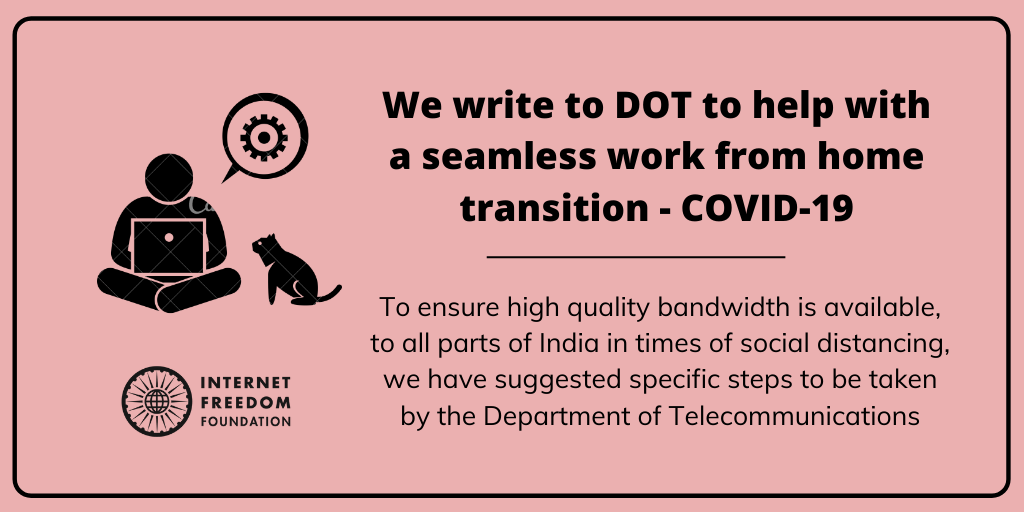
Tl;dr
Access to good quality internet has never been more important than right now. With most experts unanimous on the need for social distancing and many workplaces putting into place work from home plans, voice and data connectivity become critical. To ensure that high quality bandwidth is available to all parts of India we have suggested specific steps to be taken by the Department of Telecom.
"We the people...", of the Internet
Due to the unprecedented nature of the COVID-19 pandemic, the Union Government is taking various policy measures to safeguard the health and welfare of all Indians as per an advisory by the Ministry of Health and Family Welfare titled, “Advisory on Social Distancing Measure in view of spread of COVID-19 disease” (link). Point number 3 to this advisory recommends to, “Encourage private sector organizations/employers to allow employees to work from home wherever feasible.” A “work from home” measure is critical during this time to contain adverse economic impacts on individuals, companies and the entire Indian economy.
At the same time during this period many people are likely to undergo mental stress and will reach out to loved ones for comfort and support. Even for children, remote educational modes of learning will become vital at this time as schools are closed. Many such interests which require social distancing necessary to restrict the spread of Covid-19 are supported by the availability of telecom and data services. However, as is the case with such a measure we would like to highlight that there comes certain network capacity related risks which policymakers must respond to.
A recent report in the New York Times, dated March 16, 2020 informs us that a work and learn from home set up, leads to considerable stress on underlying network infrastructure (link). This is because last mile home service networks are designed to handle traffic patterns which are considerably different to enterprise grade internet broadband networks. Moreover, Wi-Fi based home internet systems have their own set of challenges in terms of reliability and quality of service.
We need to have a plan to support each other
We urge for crucial policy measures by putting forth a comprehensive plan in coordination with appropriate government departments and ministries. We specifically suggest the following:
- Periodic reviews of telecom infrastructure constraints: There is an urgent need for the DOT and TRAI to conduct assessments in consultation with large telecom and internet service providers on the capacity to carry voice and internet traffic. Separately, there's a need for authorities to engage with representatives from internet users both enterprise facing stakeholders and consumer facing stakeholders in challenges they may face in continuing their day to day activities online. All of these actions must nonetheless, uphold the spirit of net neutrality and not lead to discriminatory treatment of internet traffic.
- Encourage voluntary pledges by telecom companies: We recommend that a voluntary pledge may be encouraged by the Union Government in which telecom and internet service providers decide to not terminate services of any residential or small business users because of their inability to pay their bills due to disruptions caused specifically by COVID-19.
- Ensure full and complete access at all times: We urge that an advisory may be issued to all State Governments to halt any internet shutdowns or actions under the Telecommunications Suspension Rules, 2017 which are likely to increase hardship for people and organisations. This includes measures which slow down internet access speeds since that has the potential cripple economic activities.
We urge people from across the community (especially technical experts and small businesses) on if they have experienced any difficulties whilst accessing the internet, or using voice and video conferencing services. IFF will remain alert to the situation should it develop.
Important Documents
- Link to IFF’s representation to the Minister of Communications, Mr Ravi Shankar Prasad which has been copied to both the DoT and TRAI (click here)
- Link to New York Times article dated March 16, 2020 which articulates some of the network connectivity issues faced in the US (click here)
We've got your back folks! Our objective is to keep your internet experiences fair, open and private. You too can jump on the cause and #SaveTheInternet. Help us by joining forces and becoming an IFF Member today!
Facing connectivity challenges with the new work from home transition? Kick start the conversation with our community on IFF’s new forum at forum.internetfreedom.in.

